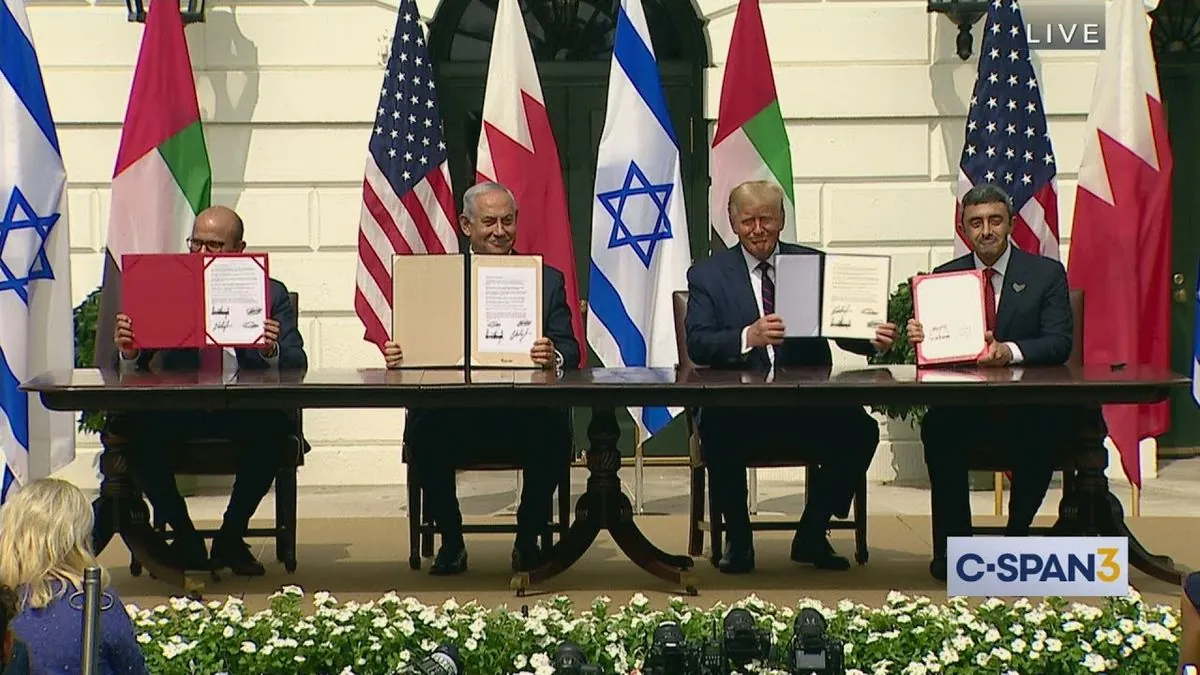Abraham Accords: A Beacon of Hope in Middle East Diplomacy
The Abraham Accords, signed in 2020, mark a significant shift in Middle East relations. Despite challenges, these agreements continue to foster economic growth and regional cooperation, offering a new path towards peace.

The Middle East has long been a region characterized by complex diplomatic relations and historical conflicts. At the center of this intricate web lies Israel, a nation whose establishment in 1948 sparked decades of tension with its Arab neighbors. For over 75 years, the region has grappled with rivalries, suspicions, and religious divisions that have often erupted into open hostilities.
The founding of Israel was immediately met with resistance. The day following its declaration of independence, a coalition of neighboring states, including Egypt, Transjordan, and Syria, launched an invasion. This set the stage for a series of conflicts that would shape the region's geopolitical landscape for decades to come.

Significant milestones in Arab-Israeli relations include the normalization of ties between Egypt and Israel in 1977, ending a prolonged state of war that had seen major conflicts in 1967 and 1973. Jordan followed suit in 1994, becoming the second Arab nation to officially recognize the Jewish state. Despite these developments, much of the Arab world remained resistant to diplomatic engagement with Israel.
A transformative moment occurred in September 2020 with the signing of the Abraham Accords. This groundbreaking agreement brought about diplomatic recognition of Israel from the United Arab Emirates, Bahrain, and Morocco. In the four years since its inception, the Accords have fostered significant growth in trade and cultural exchanges among the signatories, promoting people-to-people connections and mutual understanding.
The strategic importance of the Abraham Accords extends beyond regional dynamics, positively impacting the security interests of the United States and the United Kingdom. A new generation of Gulf leaders has emerged, viewing Israel not as an existential threat but as a potential ally against common regional challenges.
"We call for the release of hostages and unequivocally condemn Hamas."
The primary shared concern among Abraham Accords signatories and Western nations is the threat posed by Iran. The Iranian regime's aggressive behavior and support for proxy groups like Hamas, Hezbollah, and the Houthis have been significant destabilizing factors in the region.
Recent events, including the October 2023 Hamas attack on Israel and the subsequent conflict in Gaza, have tested the resilience of the Abraham Accords. Contrary to pessimistic predictions, the agreements have largely withstood these challenges. Signatory nations have maintained their commitment to the Accords while balancing condemnation of violence with calls for peace.
The United Arab Emirates has demonstrated notable leadership, leveraging its diplomatic ties with Israel to provide humanitarian aid to Gaza, including the construction of medical facilities and water desalination plants. Economic ties have also shown resilience, with trade between Morocco and Israel increasing by 64% compared to the previous year, despite ongoing regional tensions.
Looking ahead, the expansion of the Abraham Accords remains a crucial objective for regional stability and prosperity. The potential normalization of relations between Saudi Arabia and Israel could significantly alter the Middle Eastern geopolitical landscape. As the United States approaches its next presidential election, maintaining and building upon the framework of the Abraham Accords should remain a priority for policymakers in both Washington and London.
The Abraham Accords represent a vision for peace, prosperity, and security in the Middle East, emphasizing coexistence over conflict. By fostering economic cooperation and cultural understanding, these agreements lay the groundwork for a more stable and interconnected region. As challenges persist, the continued support and expansion of the Abraham Accords remain vital components of a constructive Middle East policy.



































